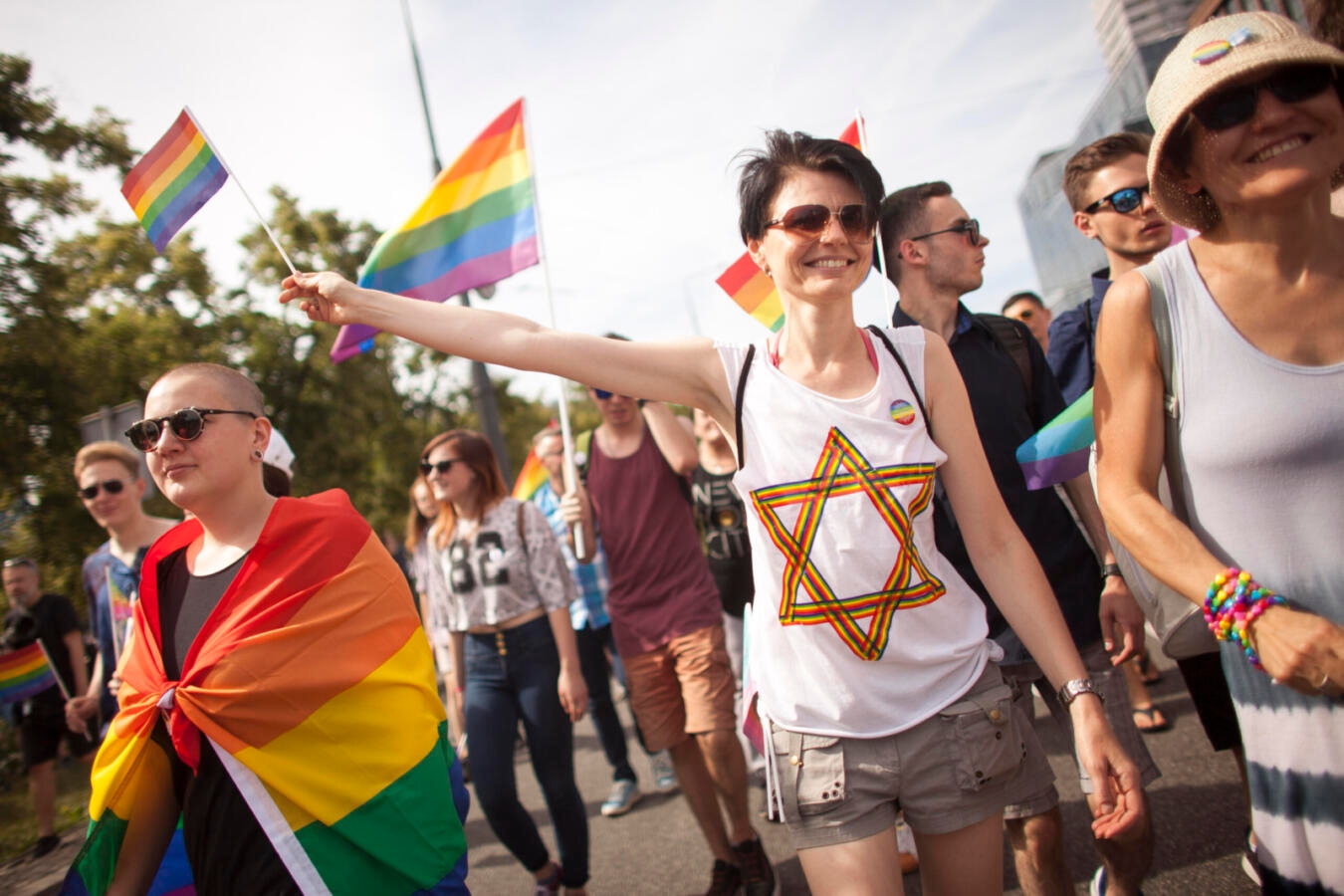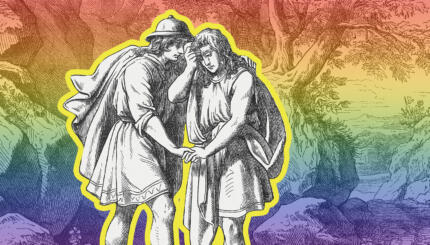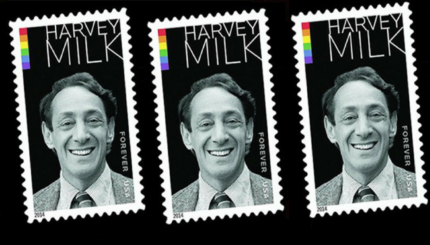As social attitudes toward lesbian, gay, bisexual, transgender and queer (LGBTQ) people have undergone a sea change globally, stances taken by Jewish leaders and movements have changed along with them.
Today, same-sex marriages are recognized by the Reform, Conservative, Renewal and Reconstructionist movements, and each movement’s rabbinical seminary ordains LGBTQ students. This has not always been the case — as recently as 1990, the Reform movement’s rabbinic leaders officially considered heterosexual relationships “the ideal human relationship for the perpetuation of species, covenantal fulfillment, and the preservation of the Jewish people.” By the mid-1990s, the movement had fully endorsed same-sex marriage — two decades before it became legal across the United States.
A decade later, the Conservative movement reversed its longstanding ban on gay sexual activity and reversed its policy of not ordaining gay and lesbian rabbis. In 2012, the movement endorsed gay marriage. All these changes were preceded by the Reconstructionist movement, which began became the first movement to accept gays and lesbians as rabbinical students in 1984 and whose rabbis have long been free to officiate at same-sex marriages.
But while the liberal Jewish community has shifted markedly on this issue, homosexuality remains a vexing issue in Orthodoxy, which continues to hold fast to the Torah’s seemingly inflexible rejection of homosexual acts.
Does Jewish tradition reject homosexuality?
The source of Jewish opposition to homosexuality lies in two nearly identical biblical verses. Leviticus 18:22 states: “Do not lie with a man as one lies with a woman; it is an abomination.” And Leviticus 20:13 states: “If a man lies with a man as one lies with a woman, the two of them have done an abomination; they shall surely be put to death—their blood shall be upon them.” Many authorities consider this prohibition to be one of Judaism’s cardinal sins and believe it must not be transgressed even at the threat of one’s life.
READ: Reading the Prohibition Against Homosexuality in Context
Even the most traditionally-minded interpreters of the verse acknowledge that the Torah does not prohibit homosexuality as such, but merely one specific sexual act — generally understood to be anal sex between two men. However, later rabbinic authorities expanded the prohibition to include lesbian sexual acts and all male homosexual activities short of anal intercourse. The biblical verses are also generally not understood as rejecting homosexuals as individuals, but merely homosexual acts.
Views differ sharply along denominational lines.
Reform: The Reform movement was the first of the major denominations to take a liberal position toward homosexuality, adopting the first of many resolutions on behalf of gays and lesbians in 1977. Gay marriage was endorsed by the rabbinate in 1996 and by the movement’s congregational arm the following year. The movement’s rabbinical school, Hebrew Union College — Jewish Institute of Religion, ceased discriminating against gay applicants in 1990.
Conservative: In 2006, the Conservative movement concluded a polarizing debate over homosexuality with the endorsement of two contradictory opinions — one upholding the movement’s previous rejection of gay relationships, and another retaining the Torah prohibition on male anal sex but allowing for other forms of sexual intimacy between members of the same sex. The latter opinion also explicitly endorsed the ordination of gays and lesbians as rabbis and cantors. Both opinions are considered equally valid, and individual Conservative rabbis may choose which one to follow.
Orthodox: Orthodox Jews on the whole continue to reject homosexual behavior as fundamentally inconsistent with Jewish law. While there is little indication that this position is severely contested within that community, let alone likely to change in the near future, there have been initiatives to make Orthodox communities more welcoming of gay Jews. A statement authored in 2010 and signed by over 200 Orthodox rabbis expressly welcomed gay Jews fully into synagogue life even as it reiterated traditional Orthodox opposition to gay sex and same-sex marriage. An Israeli Orthodox rabbinic group released a similar statement in 2016. And a number of grassroots groups for gay, lesbian, bisexual and transgender Orthodox Jews and their families have emerged, including JQY and Eshel.
What about gay marriage?
Attitudes toward gay marriage track closely with attitudes toward homosexuality generally. The Reform movement now considers same-sex marriage to qualify as kiddushin — the rabbinic term for betrothal, a holy union between two partners.
In 2012, the same three Conservative rabbis who authored the more liberal opinion on homosexuality noted above published a series of rituals and documents pertaining to same-sex marriage ceremonies and divorce. Notably, their proposals do not include kiddushin. Other Conservative rabbis, believing that gay marriage must enjoy the same status as traditional heterosexual marriage, have insisted on applying the traditional marriage rituals with only the most minor modifications in gendered language.
Orthodox rabbis on the whole do not perform same-sex marriages. In a rare joint statement in 2011, six organizations representing a broad spectrum of the Orthodox community, from modern to haredi (ultra-Orthodox), signed on to a statement affirming that the Torah “sanctions only the union of a man and woman in matrimony.”
Do any Jews support conversion therapy?
Conversion therapy — sometimes also called reparative or change therapy — refers to the effort to “cure” gays of same-sex attraction and enable them to lead heterosexual lives. It is regarded as ineffective and harmful by the American Medical Association, the American Psychiatric Association, the American Psychological Association and many others. Some Jewish authorities still support it, but they are mostly (though not exclusively) members of the haredi Orthodox community.
The main proponent of conversion therapy in the Jewish community was a New Jersey-based group called JONAH, which in 2015 was found guilty of consumer fraud for using scientifically questionable methods and claiming a success rate it could not substantiate. Later that year, a New Jersey judge ordered the group to cease operations. Though the largest Orthodox rabbinical group, the Rabbinical Council of America, had at one time commended JONAH’s work, it publicly withdrew its endorsement in 2012, citing evidence that the therapy was ineffective and had potentially negative consequences.
Some in the Orthodox community still support conversion therapy, however, in part because they believe it is impossible that homosexual desires could be both unchangeable and proscribed by the Torah.
What about Jewish attitudes toward transgender people?
The issue of transgender people in Judaism is of more recent vintage than the question of homosexuality, but attitudes among the major denominations track quite similarly. The Reform movement was the earliest trailblazer, ordaining its first transgender rabbi in 2006. In 2007, the movement’s new prayer book included blessings to sanctify gender transitions. Full equality and inclusion for transgender persons was endorsed in 2015.
The Conservative rabbinate adopted a similar resolution the following year. In 2003, the Conservative movement endorsed a rabbinic opinion stating that someone who had undergone complete sex reassignment surgery should be considered in Jewish law to have changed his or her sex status, but someone who had undergone only partial reassignment surgery should not. In the Orthodox world, sex reassignment, cross-dressing and hormonal treatments are still considered forbidden. However, some Orthodox rabbis have begun to grapple with how to reach out to and welcome transgender people.
In 2023, the queer non-denominational yeshiva SVARA published the first collection of teshuvot, or Jewish legal opinions, written by and for trans people. The teshuvot cover an array of issues, such as niddah, circumcision, mikveh immersion and gender-affirming surgeries.
Can LGBTQ Jews become rabbis and cantors?
Yes, in the liberal movements. The Reform Hebrew Union College—Jewish Institute of Religion has been accepting gay applicants since 1990, and the Reconstructionist movement’s rabbinical school has been doing so since 1984. HUC ordained its first openly transgender rabbi in 2006. The Conservative movement’s flagship Jewish Theological Seminary revised its application criteria in 2007 to allow for gay applicants and admitted its first openly gay students the following year. Orthodox seminaries still do not permit openly gay students; however there is at least one Orthodox gay rabbi who came out subsequent to his ordination.
How is the LGBTQ community treated in Israel?
By many metrics, Israel is considered a trailblazer on LGBTQ issues. Openly gay Israelis have been permitted to serve in the military since the early 1990s, nearly two decades before the U.S. military formally permitted gays to serve openly. Although same-sex marriage is not possible in Israel because the Orthodox-dominated Chief Rabbinate retains full control over marriage, same-sex couples who marry abroad can have their unions recognized by the state and enjoy many of the same rights and benefits as straight couples. Israel has regularly touted its achievements on gay rights as a sign of its progressive Western worldview, a practice some critics have derided as an attempt at “pinkwashing” — that is, to distract from its treatment of the Palestinians.
For more on LGBTQ Jewish life, visit MyJewishLearning’s Keshet blog.
haredi
Pronounced: hah-RAY-dee, Origin: Hebrew, literally “in awe of” or “fearing” God, this means ultra-Orthodox or fervently Orthodox.
Torah
Pronunced: TORE-uh, Origin: Hebrew, the Five Books of Moses.



